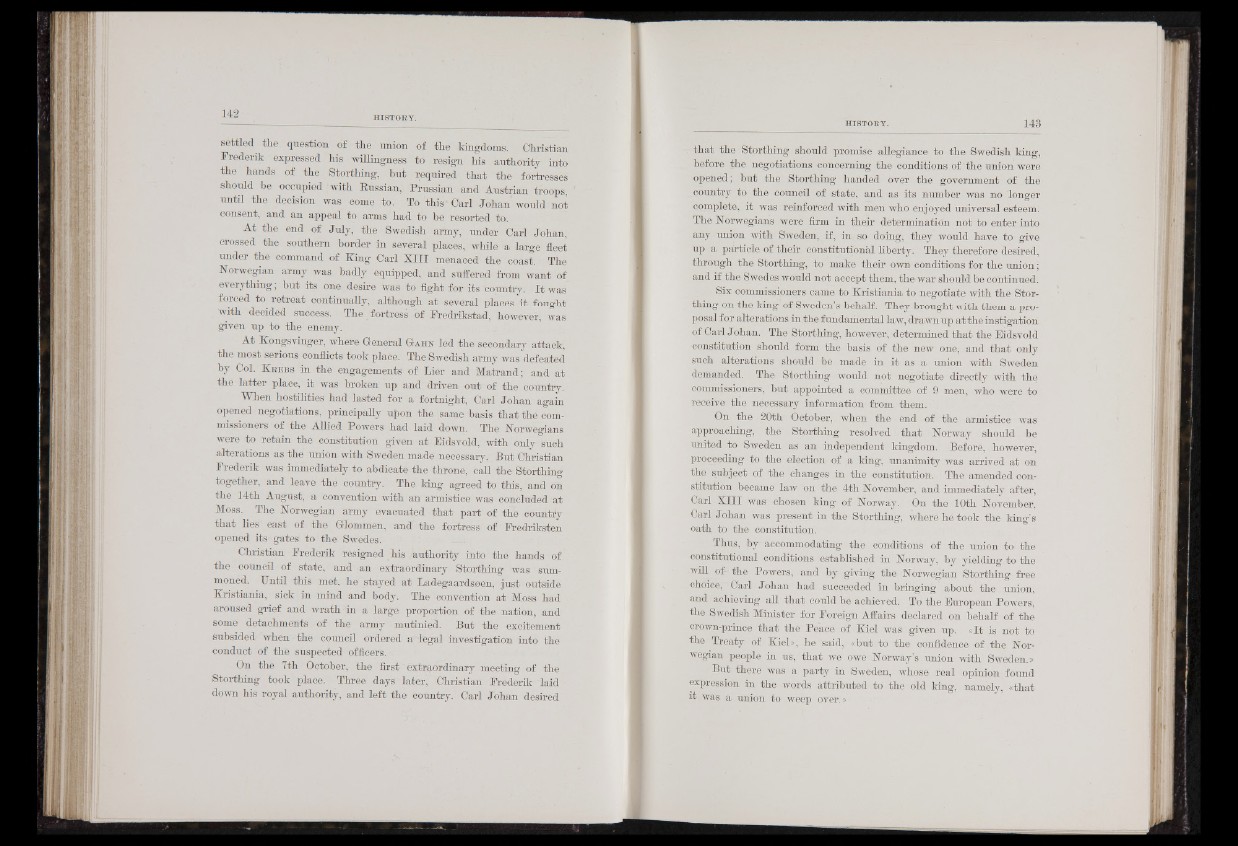
settled the question of the union of the kingdoms. Christian
Frederik expressed his willingness to resign his authority into
the hands of the Storthing, but required that the fortresses
should be occupied ;with Bussian, Prussian and Austrian troops,
until the decision was come to. To this* Carl Johan'would not
consent, and an appeal to arms had to be resorted to.
At the end of July, the Swedish army, under Carl Johan,
crossed the southern border in several places, while a large fleet
under the command of King Carl X III menaced the coast. The
Norwegian army was. badly equipped, and suffered from want of
everything; but its one desire was to fight for its country. I t was
forced to retreat continually, although at several places "it fought
with decided success. The . fortress of Fredrikstad, however, was
given up to the enemy.
At Kongsvinger, where General G a h h led the secondary attack,
the most serious conflicts took place. The Swedish army was defeated
by Col. K r e b s in the engagements of Lier and Matrand; and at
the latter place, it was broken up and driven out of the country.
When hostilities had lasted for a fortnight, Carl Johan again
opened negotiations, principally upon the same basis that the commissioners
of the Allied Powers had laid down. The Norwegians
were to retain the constitution given at Eidsvold, with only such
alterations as the union with Sweden made necessary. But Christian
Frederik was immediately to abdicate the throne, call the Storthing
together, and leave the Country. The king agreed to this, and on
the 14th August, a convention with an armistice was concluded at
Moss. The Norwegian army evacuated that part of the country
that lies east of the Glommen, and the fortress of Fredriksten
opened its-gates to the Swedes.
Christian Frederik resigned his authority into the hands of
the council of state, and an extraordinary Storthing was summoned.
IJntil this met, he stayed at Eadegaardsoen, just outside
Kristiania, sick in mind and body. The convention at Moss had
aroused grief and wrath’in a large proportion of the nation, and
some detachments of the army mutinied. But the excitement
subsided when the council ordered a legal investigation into the
conduct of the suspected officers.
On the 7th October, the first" extraordinary meeting of the
Storthing took place. Three days later, Christian Frederik laid
down his royal authority, and left the country. Carl Johan desired
that the Storthing should promise allegiance to the Swedish king,
before the negotiations concerning the conditions of'the union were
opened ; but the Storthing handed over the government of the
country to the council of state, and as its number Was no longer
complete, it was reinforced with men who enjoyed universal esteem;
The Norwegians Were firm in their determination not to enter into
any union with Sweden, if, in, so doing, they would have to give
up a particle, of their constitutional liberty. They therefore desired,
through the Storthing, to make their own conditions for the union j
and if the Swedes would not accept them, the war should be continued.
Six commissioners came to Kristiania to negotiate with the Stor-
thing on the king of Sweden's behalf. They brought with them a proposal
for alterations in the fundamental law, drawn up at the instigation
of Carl Johan. The Storthing, however, determined that the Eidsvold
•constitution should form the basis of the new one, and that only
such alterations should be made in it as a union with Sweden
demanded. The Storthing would not negotiate directly with the
commissioners, but appointed a committee of 9 men, who were to
receive the necessary information from them.
On the 20th October, when the end of the armistice was
approaching, the Storthing resolved that Norway should be
united to Sweden as an independent kingdom. Before, however,
proceeding to the election of a king, unanimity was arrived at on
the subject of the changes in the constitution. The amended constitution
became law on the 4th November, and immediatelv after,
Carl XIII was chosen king of Norway. On the 10th November,
Carl Johan was present in the Storthing, where he took the king’s
oath to the constitution.
Thus, by accommodating the conditions of the union to the
constitutional conditions established in Norway, by yielding to the
will of- the Powers, and by giving the Norwegian Storthing, free
choice, Carl Johan had succeeded in bringing about the union,
and achieving all that could be achieved. To the European Powers,
the Swedish Minister for Foreign Affairs declared on behalf of the
crown-prince that the Peace of Kiel was given up. «It is not to
the Treaty of Kiel», .he said, «but to the confidence of the Norwegian
people in us, that we owe Norway’s, union with Sweden.»
But there was a party in Sweden, whose real opinion found
expression in the words attributed to the old king, namely, «that
it was a union to weep over.»